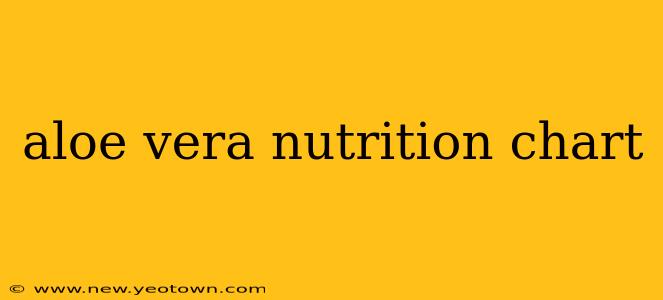Aloe vera, the succulent plant with a history as rich as its gel, has captivated cultures for millennia. More than just a soothing agent for sunburns, aloe vera boasts a surprising nutritional profile. While not a primary food source, its nutritional components contribute to its diverse applications in health and beauty. Let's delve into the fascinating world of aloe vera nutrition, exploring its composition and benefits.
What are the main nutrients in aloe vera?
Aloe vera's nutritional value is largely concentrated in its gel, the clear, pulpy substance found within its leaves. This gel is a treasure trove of vitamins, minerals, and other beneficial compounds. While the exact nutritional content can vary depending on factors like the plant's age, growing conditions, and processing methods, a general overview highlights key components:
-
Vitamins: Aloe vera gel is a good source of vitamins A, C, and E, all powerful antioxidants that combat free radical damage within the body. It also contains several B vitamins, essential for energy production and various metabolic processes. Think of it as a mini-vitamin complex within a plant!
-
Minerals: The gel is a decent source of minerals such as calcium, magnesium, potassium, manganese, and zinc. These minerals play crucial roles in various bodily functions, from bone health to enzyme activity.
-
Enzymes: Aloe vera contains a number of enzymes, including amylase and lipase, which aid in digestion. This is one reason why some people find it beneficial for digestive issues.
-
Anthraquinones: These compounds are responsible for many of aloe vera's purported medicinal properties. Aloin, a type of anthraquinone, is known for its laxative effects. However, it's important to note that excessive consumption of aloin can have adverse effects.
Is aloe vera a good source of fiber?
While the gel itself doesn't offer significant amounts of fiber, the aloe vera leaf contains some fiber, primarily in the outer layers. It’s crucial to understand that consuming the whole leaf or improperly prepared gel can cause digestive upset. The processed gel used in many products is typically much lower in fiber.
What are the benefits of aloe vera nutrition?
The nutritional components of aloe vera contribute to a range of potential health benefits. However, it’s important to remember that more research is needed to fully understand these effects. Some of the potential benefits associated with its nutritional content include:
-
Improved digestion: The enzymes present in aloe vera may aid in digestion and alleviate some digestive discomfort.
-
Boosted immunity: The vitamins and minerals in the gel support overall immune function.
-
Reduced inflammation: Some studies suggest that aloe vera may have anti-inflammatory properties.
-
Enhanced skin health: The vitamins and antioxidants in aloe vera contribute to its well-known ability to soothe and heal skin.
How many calories are in aloe vera?
Aloe vera gel is surprisingly low in calories, usually containing less than 20 calories per 100 grams. This makes it a suitable addition to a weight-management plan, when incorporated appropriately.
Does aloe vera have any side effects?
While generally considered safe for topical use, ingesting aloe vera, especially in large amounts or over prolonged periods, can have potential side effects. These can include diarrhea, abdominal cramps, and interactions with certain medications. It's crucial to consult with a healthcare professional before using aloe vera internally, particularly if you have pre-existing health conditions. Furthermore, always choose products from reputable sources, as the quality and processing can significantly impact safety and efficacy.
This information is for educational purposes only and is not intended as a substitute for professional medical advice. Always consult with a healthcare professional before making any decisions related to your health or treatment. The nutritional composition of aloe vera can vary, so always check the specific product information for the most accurate data.

